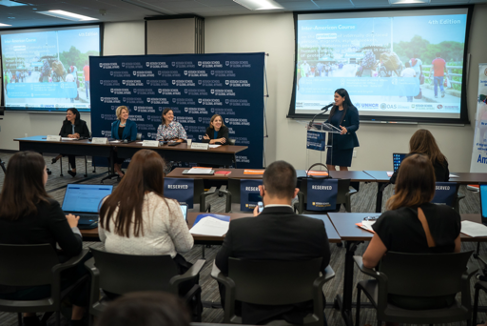POLICY and PRACTICE E-VAW LAB
By drawing evidence-based knowledge, the E-VAW Lab seeks to accompany policymakers and practitioners’ efforts to prevent gender-based violence, more effectively provide services to survivors, and increase survivors’ access to justice. Our collaborative work seeks to nurture a two-way street wherein ongoing conversations with policymakers and practitioners inform our research agenda and research outlines strategies for governments and civil society to implement on the ground.
Collaborating with UN Women, El Salvador, we pursue three main goals: 1) the identification of effective messages to generate attitudinal and behavioral change supportive of women’s safety, 2) the examination of the root causes of women’s migration and female returnees’ reintegration, and 3) the promotion of transitional justice mechanisms on redressing gender-based violence during and after war.

Partnering with the Organization of American States, Department of Inclusion, the E-VAW Lab investigates the disproportionate effects of migration and forced displacement on women and other vulnerable populations as well as the effects of migration policy on immigrants’ human dignity and wellbeing. Drawing from large-scale panel survey findings and extensive fieldwork at the southern border of Mexico by the E-VAW Lab’s director and research affiliate Natán Skigin, we also provide evidence on how media campaigns can promote pro-immigrant attitudes and support for immigrant integration in host communities.
The E-VAW’s activities include co-organizing, along with the OAS and its Department of Inclusion, the annual Inter-American Course on the protection of internally displaced persons, migrants, asylum seekers, refugees, stateless persons, survivors of human trafficking and returnees in need of protection in the Americas. The Fourth edition of the Inter-American Course took place in June, 2023 at the Keough School’s office in Washington, D.C. This learning and professional development space aimed at strengthening the technical knowledge of officials of the Permanent Missions of the OAS Member States and Permanent Observers to the OAS, the General Secretariat, national institutions and other interested stakeholders on forced displacement, asylum, and migration. This course was presented by the OAS Department of Social Inclusion in partnership with the UNHCR, the Keough School of Global Affairs and its Kellogg Institute for International Studies and Pulte Institute for Global Development.


A training on migration and human rights provided by Notre Dame’s Keough School of Global Affairs, the Kellogg Institute, and the Organization of American States in Washington in August, 2023.
Collaborating with Tecnologico de Monterrey, the E-VAW Lab carries out academic and policy work on the effects of civil society’s engagement with emergency alert systems on preventing and eradicating violence against women in Mexico. As a groundbreaker of its kind, the Alert of Gender Violence Against Women includes inter-institutional actions for the prevention, attention, sanction, and eradication of violence against women. It also integrates civil society organizations into governmental responses to gender-based violence. By evaluating the effectiveness of this innovative system, this research project seeks to distill lessons applicable to other mid-income countries grappling with violence against women such as El Salvador, Brazil, and Colombia.
Collaborating with Dejusticia—a Bogotá-based think-and-do tank—we identify effective messages to increase public condemnation of lethal violence against women involved in peacebuilding in Colombia. Also, we produce policy reports to inform domestic judicial rulings that call for effective policies to prevent violence against human rights defenders, including women. In addition, we collect experimental data on citizen attitudes and behavior toward human rights trials by the Special Jurisdiction for Peace (JEP in Spanish) that prosecutes war atrocities committed by state armed forces and former guerrillas following the 2016 peace agreement.





